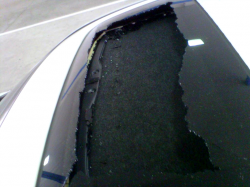— A Honda exploding sunroof class action lawsuit will continue in court after the federal judge refused to dismiss nearly all the claims made against Acura and Honda.
The eight plaintiffs who filed the lawsuit are from California, Florida, Illinois, Missouri and Washington.
According to the exploding sunroof lawsuit, the glass shatters because it's tempered, “generally made by shaping and cutting a piece of annealed glass that is then heated and rapidly cooled.”
“This tempering process creates an outer layer of compression that is shrink-wrapped around the middle of the glass, which is constantly pressing outwards. If the outer layer is compromised then the entire piece of glass explosively shatters” and can “explode suddenly, causing thousands of pieces of glass to rain down at once onto the driver and occupants of the vehicle, as well as those nearby.” — Honda exploding sunroof lawsuit
The class action alleges the Acura and Honda tempered sunroof glass includes sodium carbonate and calcium oxide, known as soda-lime glass. This glass allegedly reduces vehicle weight which can increase fuel efficiency.
The class action lawsuit includes “all model year 2015-2022 Honda and Acura vehicles equipped with a sunroof or moonroof manufactured with tempered glass.”
Motion to Dismiss the Honda Exploding Sunroof Lawsuit
Honda told the judge the plaintiffs didn't have standing to bring claims about Honda and Acura models not owned by those plaintiffs.
Honda argues the only vehicles that should be included in the lawsuit are these models owned by the plaintiffs who sued: 2016 Honda Civic, 2022 Acura MDX, 2019 Acura TLX, 2019 Acura TLX, 2020 Honda Odyssey, 2021 Honda Pilot and 2017 Honda Accord.
Showing how courts arrive at results based on which judge is assigned the case, Judge Dale S. Fischer said district courts within the Ninth Circuit are split as to whether named plaintiffs may represent other customers who did not buy the same products as they did.
In other words, some courts would rule only models owned by the named plaintiffs could be included in the class action. But other courts would say models not owned by the named plaintiffs could not be covered by the lawsuit.
In this Honda exploding sunroof lawsuit, the judge agreed with the plaintiffs and denied Honda's motion to dismiss for a lack of standing to sue.
Honda also argued implied warranty claims failed because the plaintiffs didn't allege facts to show their vehicles were "unfit for their ordinary purpose."
Honda told the the judge while the plaintiffs may have experienced a “startling event that distracted them while they were driving,” this does not make their vehicles unfit for the purpose of transportation.
But the judge said he must take the allegations as true when the plaintiffs say exploding sunroofs are a safety hazard. Therefore, the judge denied Honda’s motion to dismiss breach of the implied warranty of merchantability claims.
As for an express warranty claim, Honda argued the claim failed because the warranties do not cover broken glass, “unless it is due to a defect in material or workmanship.” According to Honda, the plaintiffs allege only a design defect not covered by the warranties, but the judge disagreed and said the claim can continue.
Judge Fischer further denied Honda's motion to dismiss claims based on fraud by omission, but Honda did convince the judge to toss a claim for fraudulent concealment.
In addition, Honda asserts the exploding sunroof lawsuit doesn't allege Honda's sunroofs have shattered and exploded more often than sunroofs of other automakers. However, the judge said, "Honda cites no authority requiring Plaintiffs to make such allegations."
The Honda exploding sunroof class action lawsuit was filed in the U.S. District Court for the Central District of California: Tappana, et al., vs. American Honda Motor Co., Inc.
The plaintiffs are represented by Girard Sharp LLP, Sauder Schelkopf LLC, Chimicles Schwartz Kriner & Donaldson-Smith LLP, and Gordon & Partners.

